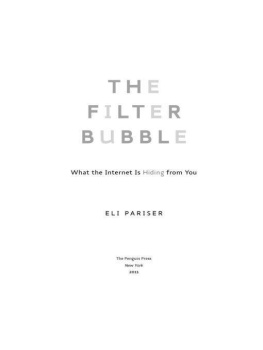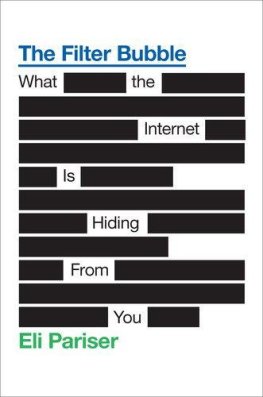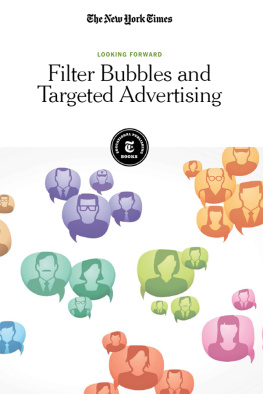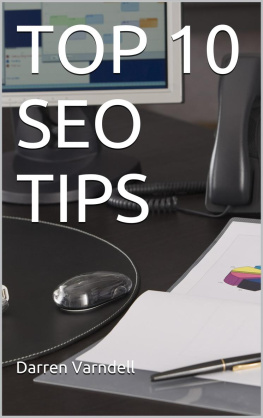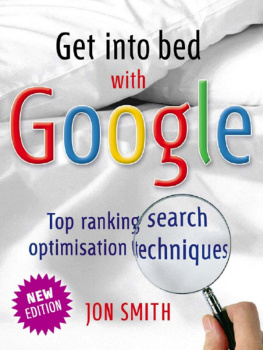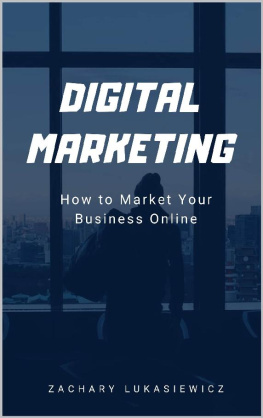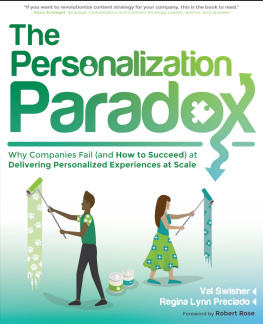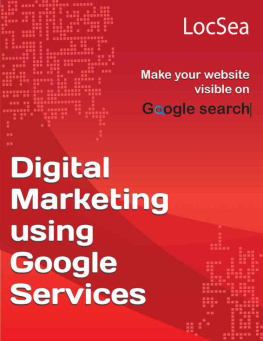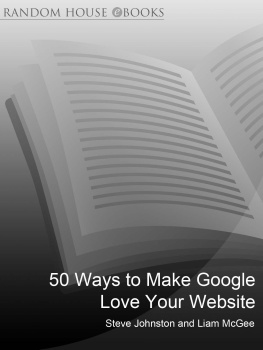

Table of Contents
Advance Praise for The Filter Bubble
Internet firms increasingly show us less of the wide world, locating us in the neighborhood of the familiar. The risk, as Eli Pariser shows, is that each of us may unwittingly come to inhabit a ghetto of one.
Clay Shirky, author of Here Comes Everybody and Cognitive Surplus
Personalization sounds pretty benign, but Eli Pariser skillfully builds a case that its excess on the Internet will unleash an information calamityunless we heed his warnings. Top-notch journalism and analysis.
Steven Levy, author of In the Plex: How Google Thinks, Works and Shapes Our Lives
The Internet software that we use is getting smarter, and more tailored to our needs, all the time. The risk, Eli Pariser reveals, is that we increasingly wont see other perspectives. In The Filter Bubble, he shows us how the trend could reinforce partisan and narrow mindsets, and points the way to a greater online diversity of perspective.
Craig Newmark, founder of craigslist
Eli Pariser has written a must-read book about one of the central issues in contemporary culture: personalization.
Caterina Fake, cofounder of flickr and Hunch
You spend half your life in Internet space, but trust meyou dont understand how it works. Eli Parisers book is a masterpiece of both investigation and interpretation; he exposes the way were sent down particular information tunnels, and he explains how we might once again find ourselves in a broad public square of ideas. This couldnt be a more interesting book; it casts an illuminating light on so many of our daily encounters.
Bill McKibben, author of The End of Nature and Eaarth and founder of 350.org
The Filter Bubble shows how unintended consequences of well-meaning online designs can impose profound and sudden changes on politics. All agree that the Internet is a potent tool for change, but whether changes are for the better or worse is up to the people who create and use it. If you feel that the Web is your wide open window on the world, you need to read this book to understand what you arent seeing.
Jaron Lanier, author of You Are Not a Gadget
For more than a decade, reflective souls have worried about the consequences of perfect personalization. Eli Parisers is the most powerful and troubling critique yet.
Lawrence Lessig, author of Code, Free Culture, and Remix
Eli Pariser isnt just the smartest person I know thinking about the relationship of digital technology to participation in the democratic processhe is also the most experienced. The Filter Bubble reveals how the world we encounter is shaped by programs whose very purpose is to narrow what we see and increase the predictability of our responses. Anyone who cares about the future of human agency in a digital landscape should read this bookespecially if it is not showing up in your recommended reads on Amazon.
Douglas Rushkoff, author of Life Inc. and Program or Be Programmed
In The Filter Bubble, Eli Pariser reveals the news slogan of the personalized Internet: Only the news that fits you we print.
George Lakoff, author of Dont Think of an Elephant! and The Political Mind
Eli Pariser is worried. He cares deeply about our common social sphere and sees it in jeopardy. His thorough investigation of Internet trends got me worried, too. He even taught me things bout Facebook. Its a must-read.
David Kirkpatrick, author of The Facebook Effect
THE PENGUIN PRESS
Published by the Penguin Group Penguin Group (USA) Inc., 375 Hudson Street, New York, New York 10014, U.S.A. Penguin Group (Canada), 90 Eglinton Avenue East, Suite 700, Toronto, Ontario, Canada M4P 2Y3 (a division of Pearson Penguin Canada Inc.) Penguin Books Ltd, 80 Strand, London WC2R 0RL, England Penguin Ireland, 25 St. Stephens Green, Dublin 2, Ireland (a division of Penguin Books Ltd) Penguin Books Australia Ltd, 250 Camberwell Road, Camberwell, Victoria 3124, Australia (a division of Pearson Australia Group Pty Ltd) Penguin Books India Pvt Ltd, 11 Community Centre, Panchsheel Park, New Delhi110 017, India Penguin Group (NZ), 67 Apollo Drive, Rosedale, Auckland 0632, New Zealand (a division of Pearson New Zealand Ltd) Penguin Books (South Africa) (Pty) Ltd, 24 Sturdee Avenue, Rosebank, Johannesburg 2196, South Africa
Penguin Books Ltd, Registered Offices: 80 Strand, London WC2R 0RL, England
First published in 2011 by The Penguin Press, a member of Penguin Group (USA) Inc.
Copyright Eli Pariser, 2011
All rights reserved
eISBN : 978-1-101-51512-9
Without limiting the rights under copyright reserved above, no part of this publication may be reproduced, stored in or introduced into a retrieval system, or transmitted, in any form or by any means (electronic, mechanical, photocopying, recording or otherwise), without the prior written permission of both the copyright owner and the above publisher of this book.
The scanning, uploading, and distribution of this book via the Internet or via any other means without the permission of the publisher is illegal and punishable by law. Please purchase only authorized electronic editions and do not participate in or encourage electronic piracy of copyrightable materials. Your support of the authors rights is appreciated.
While the author has made every effort to provide accurate telephone numbers and Internet addresses at the time of publication, neither the publisher nor the author assumes any responsibility for errors, or for changes that occur after publication. Further, the publisher does not have any control over and does not assume any responsibility for author or third-party Web sites or their content.
http://us.penguingroup.com
To my grandfather, Ray Pariser, who taught me that scientific knowledge is best used in the pursuit of a better world. And to my community of family and friends, who fill my bubble with intelligence, humor, and love.
INTRODUCTION
A squirrel dying in front of your house may be more relevant to your interests right now than people dying in Africa.
Mark Zuckerberg, Facebook founder
We shape our tools, and thereafter our tools shape us.
Marshall McLuhan, media theorist
F ew people noticed the post that appeared on Googles corporate blog on December 4, 2009. It didnt beg for attentionno sweeping pronouncements, no Silicon Valley hype, just a few paragraphs of text sandwiched between a weekly roundup of top search terms and an update about Googles finance software.
Not everyone missed it. Search engine blogger Danny Sullivan pores over the items on Googles blog looking for clues about where the monolith is headed next, and to him, the post was a big deal. In fact, he wrote later that day, it was the biggest change that has ever happened in search engines. For Danny, the headline said it all: Personalized search for everyone.
Starting that morning, Google would use fifty-seven signals everything from where you were logging in from to what browser you were using to what you had searched for beforeto make guesses about who you were and what kinds of sites youd like. Even if you were logged out, it would customize its results, showing you the pages it predicted you were most likely to click on.
Most of us assume that when we google a term, we all see the same resultsthe ones that the companys famous Page Rank algorithm suggests are the most authoritative based on other pages links. But since December 2009, this is no longer true. Now you get the result that Googles algorithm suggests is best for you in particularand someone else may see something entirely different. In other words, there is no standard Google anymore.
Next page
